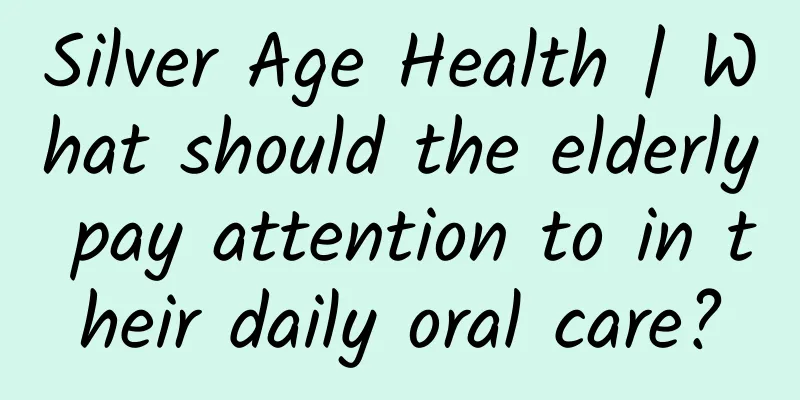Silver Age Health | What should the elderly pay attention to in their daily oral care?

|
We often hear the saying: "Good teeth mean a good appetite, everything tastes delicious, and you are in good health." Oral health of the elderly is of great significance to longevity. The fourth national oral health epidemiological survey shows that among the elderly aged 65 to 74, the proportion of people without teeth is 4.5%, the periodontal health rate is only 9.3%, the caries rate of permanent teeth is as high as 98%, and the number of elderly people who have never undergone tooth restoration treatment is as high as 36.8%. Oral diseases in the elderly are more closely related to systemic diseases, which seriously affect the physical health and quality of life of the elderly. So what are the special features of oral care for the elderly? What aspects should be paid attention to? For the daily oral care of the elderly, the following things must be done carefully. ▏Brush your teeth every morning and evening and use interdental cleaning tools As people age, oral health problems become more and more prominent. Tooth loss, periodontal disease, bad breath, etc. are the main problems of oral health for the elderly. However, many elderly people can maintain their oral health by brushing their teeth and using interdental cleaning tools every morning and evening. Brushing your teeth every morning and evening is an important step to keep your mouth clean. The elderly should choose a soft-bristled toothbrush because it is less irritating to the teeth and gums. At the same time, the elderly should use fluoride toothpaste because it can effectively prevent tooth decay and periodontal disease. The brushing time should be controlled within 2 to 3 minutes, and every surface should be brushed without missing any. However, simply brushing your teeth in the morning and evening cannot completely clean your mouth. Due to irregular teeth, periodontal disease and other reasons, food residues and bacteria are easily left in the gaps between teeth. Therefore, the elderly need to use interdental cleaning tools to clean the gaps between teeth. Interdental cleaning tools include dental floss, interdental brushes, etc., which can effectively remove food residues and bacteria in the gaps between teeth, prevent periodontal disease and bad breath. When using interdental cleaning tools, the elderly should pay attention to the following points. First, you should choose a cleaning tool that is suitable for your interdental space before use, such as dental floss or interdental brushes. Secondly, you should gently insert it into the interdental space to avoid damaging the gums. Finally, you should clean and disinfect the cleaning tools in time after use to keep them clean and hygienic. To maintain oral health, the elderly need to brush their teeth and use interdental cleaning tools every morning and evening. These daily oral health care measures can effectively prevent oral diseases and odors and improve the quality of life of the elderly. ▏ Dentures also need to be cleaned thoroughly every day The elderly also need to clean their dentures every day. As they age, many elderly people's teeth will gradually fall out, which will not only affect their diet, but also their self-esteem and quality of life. Therefore, many elderly people will choose to use dentures to restore their oral function. However, using dentures does not mean that the maintenance of oral hygiene can be ignored. In fact, the elderly need to clean their dentures every day. Dentures are artificial teeth that require the same attention and care as real teeth. Just like real teeth, dentures can accumulate food particles and bacteria, which can lead to oral health problems such as bad breath, gingivitis, and periodontal disease if not cleaned promptly. Therefore, it is very important for seniors to clean their dentures every day. Cleaning dentures is simple. First, remove your dentures and gently brush them with a soft-bristled toothbrush. Be careful not to use a hard-bristled brush or apply excessive force, as this can damage the dentures. Alternatively, you can use denture cleaning tablets or denture cleaners. These products can help remove bacteria and stains from your dentures, making them cleaner and more hygienic. In addition to cleaning dentures, the elderly also need to pay attention to oral hygiene. Go to the dentist regularly for checkups and cleanings to ensure oral health. In addition, the elderly should also maintain a healthy lifestyle, such as quitting smoking, controlling diet, and increasing exercise, which all help maintain oral health. It is very important for the elderly to clean their dentures every day. This not only maintains oral hygiene, but also prolongs the service life of dentures and improves the quality of life of the elderly. ▏Topical fluoride and a healthy diet to prevent root caries Topical fluoride is an effective way to prevent tooth decay. Fluoride ions can enhance the acid resistance of the tooth surface, making it less susceptible to bacterial erosion. Under the guidance of a dentist, the elderly can use fluoride toothpaste or fluoride mouthwash to regularly apply topical fluoride to enhance the tooth's ability to resist tooth decay. In addition to topical fluoride, a proper diet is also an important factor in maintaining oral health. The elderly should maintain a balanced diet and eat more foods rich in nutrients such as calcium, phosphorus, vitamins, such as milk, tofu, green leafy vegetables, etc. At the same time, avoid eating too much sugar and high-sugar foods to reduce the increase in oral acidity and reduce the chance of bacterial growth. Preventing root caries is another key to maintaining oral health for the elderly. As we age, the gums gradually shrink, and the root surface is exposed and vulnerable to bacterial invasion. In order to prevent the occurrence of root caries, the elderly should have regular oral examinations to detect and deal with root surface problems in a timely manner. In addition, the elderly can also choose to use oral care products such as toothpaste and mouthwash that have anti-root caries effects. ▏Pay attention to bleeding gums and loose teeth Bleeding gums and loose teeth are common problems for many elderly people. Therefore, it is very necessary for the elderly to pay attention to bleeding gums and loose teeth. Bleeding gums are usually caused by gingivitis or periodontitis. These oral diseases are related to long-term poor oral hygiene, tartar deposition, and plaque growth. The elderly are more susceptible to these diseases due to their decreased immunity and weakened oral self-repair ability. Bleeding gums not only affect the daily life of the elderly, such as eating and communicating, but may also indicate more serious oral problems. Loose teeth are often related to periodontitis. Periodontitis is a destructive disease that affects the health of periodontal tissues, causing loose teeth and tooth loss. In addition, osteoporosis is also an important cause of loose teeth in the elderly. Loose teeth not only affect the oral health of the elderly, but also have a negative impact on their self-confidence and quality of life. To prevent gum bleeding and loose teeth, the elderly should develop good oral hygiene habits. Brush your teeth twice a day and use auxiliary cleaning tools such as dental floss and mouthwash. Regular oral examinations and teeth cleaning should be performed to remove tartar and plaque in a timely manner. In addition, the elderly should increase their intake of calcium and vitamin D and maintain appropriate amounts of exercise to reduce the risk of osteoporosis. ▏Extract teeth that cannot be retained and repair missing teeth in time For those teeth that cannot be retained, the elderly should extract them in time. Tooth extraction is a common oral treatment method that can eliminate problems such as tooth pain, infection, and inflammation. If the elderly retain teeth that cannot be treated, they will not only continue to suffer from pain and discomfort, but may also cause other oral problems such as periodontitis, oral infection, etc. After tooth extraction, the elderly should repair missing teeth in time. There are many ways to repair missing teeth, such as dental implants, porcelain teeth, removable dentures, etc. The elderly can choose a repair method that suits them according to their oral conditions and economic conditions. Repairing missing teeth can not only restore the chewing function of the elderly, but also improve their oral health. When the elderly receive oral treatment, they should choose a regular dental hospital and a professional dentist. Regular dental hospitals have advanced medical equipment and technology and can provide high-quality oral treatment services for the elderly. Professional dentists can develop personalized treatment plans based on the specific conditions of the elderly to ensure the effectiveness and safety of the treatment. ▏Pay attention to changes in oral mucosa to prevent oral cancer The elderly should pay special attention to changes in the oral mucosa to prevent oral cancer. The oral mucosa is a thin film covering the surface of the oral cavity, which plays a vital role in maintaining oral health. However, with age, the oral mucosa will gradually become thinner and atrophy, resulting in a decrease in the self-cleaning ability of the oral cavity, making it easy for bacteria and viruses to grow. The reproduction and metabolic products of these microorganisms will irritate the oral mucosa, causing inflammation, ulcers and other lesions, increasing the risk of oral cancer. Therefore, the elderly should have regular oral examinations to detect abnormal changes in the oral mucosa in a timely manner. If white, red or black patches, ulcers, pain and other symptoms are found in the oral mucosa, you should seek medical attention in a timely manner. The doctor will take appropriate diagnosis and treatment measures based on the patient's specific situation to prevent the occurrence of oral cancer. In addition, the elderly should maintain good oral hygiene habits, such as brushing teeth and gargling every day. At the same time, they should avoid harmful habits such as smoking and drinking to reduce irritation and damage to the oral mucosa. A reasonable diet is also one of the important measures to maintain oral health. The elderly should eat more foods rich in vitamins, minerals and dietary fiber to enhance the body's immunity and improve the resistance of the oral mucosa. ▏Have an oral health check-up and clean your teeth at least once a year Due to the aging of teeth and changes in the oral environment, the elderly are prone to loose teeth, gingivitis, periodontitis and other problems. In order to maintain the oral health of the elderly, regular oral examinations and teeth cleaning are very necessary. Annual oral health checkups can help the elderly detect oral problems such as caries and periodontitis in a timely manner. These problems are relatively easy to treat and have better results when they are discovered in the early stages. Through regular checkups, the elderly can understand their oral conditions in a timely manner, listen to the doctor's advice, and take appropriate preventive measures. Teeth cleaning is an effective method of oral health care. Regular teeth cleaning can remove dental plaque and tartar on the surface of teeth and prevent the occurrence of periodontal disease. During the teeth cleaning process, the doctor will also conduct a comprehensive examination of the teeth of the elderly to identify and deal with potential problems. The elderly can choose the frequency of teeth cleaning that suits them according to their own situation. Generally speaking, it is more appropriate to have teeth cleaning 1 to 2 times a year. For some elderly people with more serious oral problems, more frequent teeth cleaning may be required. The elderly should pay attention to their oral health and have an oral health check every year. These measures can effectively prevent the occurrence of oral problems, maintain oral health, and improve the quality of life of the elderly. At the same time, children and society should also pay attention to the oral health of the elderly and provide necessary support and help. (Picture from the Internet) Author | Han Mei is a practicing pharmacist who has worked in a well-known national tertiary hospital for more than 30 years and has rich medical care experience. She has represented the hospital on many occasions to go out for exchanges and study. She is an expert in food hygiene and nutrition, has a national nutritionist qualification, and is a science enthusiast. |
Recommend
Local numbness on the outer thigh of pregnant women
The thighs and calves are organs in the human bod...
Why is there milk after childbirth?
After a woman becomes pregnant, the hormones in h...
Severe stomach pain in three months of pregnancy
If you experience stomach pain during the third m...
What is the cause of menstrual heat?
Every woman's physical health is different, b...
What to do if you have vaginal bleeding during sex
Bleeding during sexual intercourse is a common gy...
We catch colds twice a year, and the viruses we infect are different every 100 years丨Virus Super Topic
Cold is a general term for a class of diseases wi...
Do you know what vulvar leukoplakia is?
Nowadays, many people have heard of vulvar leukop...
Should wisdom teeth be removed? If it doesn't hurt, you can just leave it alone? Here are all the answers about wisdom teeth
Most people don’t know they have wisdom teeth. So...
comScore: 2017 US Cross-Platform Report
199IT original compilation According to the lates...
Falling after medical abortion
If a woman chooses to have an artificial abortion...
Gynecological inflammation is always not good
Gynecological inflammation in women can be said t...
Why do women urinate frequently at night when it is normal during the day?
In layman's terms, frequent urination means t...
Cervical cerclage time
The cervical cerclage operation still has a certa...
Can coffee prevent COVID-19? Why do people fart more when they are positive? 10 COVID-19 questions and answers you care about
As more and more friends have tested positive, th...
35 weeks of pregnancy uterine height abdominal circumference standard
Everyone has a different physique and the conditi...









